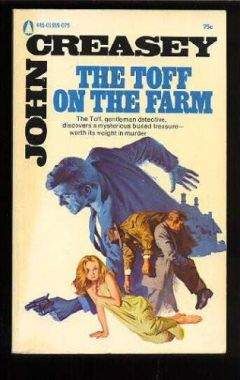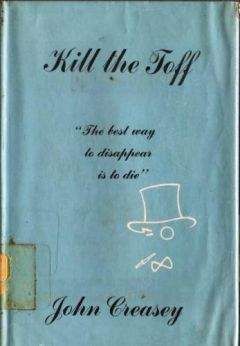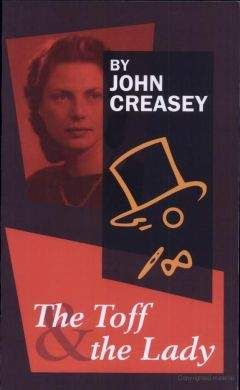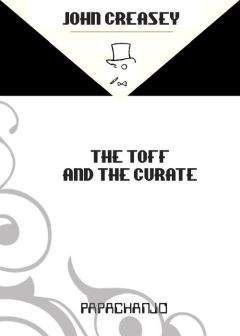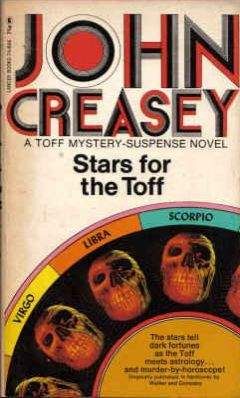John Creasey - The Toff In Town

Обзор книги John Creasey - The Toff In Town
JOHN CREASEY
The Toff In Town
Copyright Note
This e-book was created by papachanjo, with the purpose of providing a digitized format of the books written by John Creasey without the least intention of commercial gain of any sort. This e-book should hence be utilized for reading only and if you like it and can buy it, please do to support the publishers.
I am trying to create at least an ample collection of all the John Creasey books which are in the excess of 500 novels. Having read and possess just a meager 10 of his books does not qualify me to be a fan but the 10 I read were enough for me to rake up some effort to scan and create these e-books.
If you happen to have any John Creasey book and would like to add to the free online collection which I’m hoping to bring together, you can do the following:
Scan the book in greyscale
Save as djvu - use the free DJVU SOLO software to compress the images
Send it to my e-mail: [email protected]
I’ll do the rest and will add a note of credit in the finished document.
from back cover
In this gripping tale of suspense the Toff must find his way through a maze of deception, subterfuge and foolhardy obstinacy. It is a race against time to uncover the secret in a man’s past that is threatening to destroy not only him but all those around him as well.
Table of Contents
Copyright Note
Chapter One
Chapter Two
Chapter Three
Chapter Four
Chapter Five
Chapter Six
Chapter Seven
Chapter Eight
Chapter Nine
Chapter Ten
Chapter Eleven
Chapter Twelve
Chapter Thirteen
Chapter Fourteen
Chapter Fifteen
Chapter Sixteen
Chapter Seventeen
Chapter Eighteen
Chapter Nineteen
Chapter Twenty
Chapter Twenty-One
CHAPTER ONE
FEAR
WHEN the telephone bell rang, Allen sat hunched up in an easy chair, looking out of the window. His wife was entering the room, and saw him stiffen and glance round. She said: “I’ll go.” She caught a glimpse of the fear in her husband’s eyes before he turned away again and looked over the roof-tops and the chimneys. The telephone bell kept ringing.
“Well, go on, if you’re going,” Allen said gruffly.
His wife went into the tiny hall and took up the receiver but did not speak immediately, her heart was beating so fast. Fear was contagious, and Bob was so terribly afraid. At last she spoke in a low-pitched voice.
“Barbara Allen speaking.”
“Good-morning, Mrs. Allen,” a man said. “May I speak to your husband?”
“Yes. Just a moment.”
The voice was familiar. Mellow, pleasant, friendly, yet whenever Bob received a message from this man, whom she did not know, his fear reached a pitch which drove him almost to frenzy. But she wasn’t going to quarrel with Bob again, he wasn’t well—neither physically nor mentally well.
“It’s for you,” called Barbara.
He came into the hall, staring hard at her, and drew back, as if he were going to refuse to take the call. Then he moved forward, limping noticeably, and took the receiver from her.
“Allen speaking,” he said gruffly.
He stood still, looking blankly at a black-and-white drawing of a thatched cottage on the wall. Barbara saw the naked fear in his eyes—and noticed the little pulse beating in his neck.
“Yes,” he said; the word came out sharply.
A pause, and then: “But surely Saturday——”
He broke off. Barbara could just hear the other man’s voice coming from the receiver, but she could not distinguish the words. Bob’s left hand was clenching and unclenching. It seemed a long time before he replaced the receiver, after a reluctant: “All right.”
He turned back to the sitting-room.
“Bob,” said Barbara.
“Oh, don’t pester me!” he snapped.
She tried to stifle the little catch in her breath, almost a sob, but didn’t succeed, and Allen paused in the doorway and looked round. His eyes were haunted. His face was so thin and long, there were dark patches beneath his eyes; his mouth, wide and generous and droll at ordinary times, was set tightly. He paused as if to speak to her, but changed his mind. He didn’t close the door.
Barbara composed herself and went into the small kitchen.
She’d known happiness reach a point of ecstasy here; and despair; and contentment. She had been standing by the sink when the telegram had arrived announcing that her husband was missing—from a flight in Burma. She had been taking some rock cakes out of the oven when another telegram had come—only three months ago, many years after he had been “lost” and “presumed dead”. It had read:
“Your husband alive and well.”
Ecstasy . . .
And now she despaired again.
“Alive and well” had been an exaggeration, even then; he had been weak after living for years with natives in an unexplored, inaccessible part of Burma. When she had reached Burma by air and seen him, she had hardly recognised him, partly because he was in the middle of a bout of malaria. But not until they had been half-way home, in the ship, had these fits of fear taken hold of him. She put them down to some evil memory held deep in the dark recesses of his mind; but they had become worse, far worse.
Each day the same man had telephoned.
This was the first time that she hadn’t asked afterwards: “Bob, tell me what it’s about, what’s worrying you,” and thus precipitated a scene. She was determined to wait until he was ready to confide in her; they couldn’t go on like this.
She lit the grill; air got into the gas and hissed, and she turned the tap off. In the little silence which followed she heard a footstep, and looked into the hall Bob’s hand was outstretched, reaching for his hat. When he saw her, he snatched his hat off the peg.
“Bob!” she Exclaimed.
“I’m going out,” he said harshly. “Won’t be long.”
Her good intentions failed her, and she hurried out into the hall.
“Bob, you must tell me——”
“We’re not going into that again,” he growled.
She hated the way he looked at her, and yet she knew he saw something else, not her face, but the thing which frightened him.
She felt suddenly cool, calm and decided.
“Yes, we are going into that again,” she insisted. “If you leave without telling me what that man said, what’s worrying you so much, I’m going to take things into my own hands.”
He fiddled with the brim of his hat.
“Well, what are you going to do about it?” he demanded. She knew that he could hardly speak civilly; he began to tremble, as if another bout of malaria were coming on, but it was only the tension.
“I’m going to the police,” she declared. “I’m going to tell them that you——”
He flung his hat aside and crossed the hall, and she hardly noticed his limp. He clutched her wrists; his fingers were long and powerful and he hurt her. His eyes blazed, as they always did when he flew into a temper. He pulled her to him, and their faces were very close together.
“Don’t say that again,” he rasped. “Don’t you dare go to the police. Understand me?”
She didn’t try to get away, but spoke quietly, keeping unnaturally calm.
“If you leave without telling me what’s worrying you, I shall go to the police and tell them that since you’ve been back in England you’ve been—terrified. I shall tell them about the man on the telephone, and I shall say that I’m afraid you’ll do something desperate if you don’t get help.”
His grip was so tight that the pain almost made her cry out, but she clenched her teeth and returned his furious gaze. The little vein in his neck beat furiously, his lips were compressed into a thin line, his nostrils distended.
“You—wouldn’t—dare!”
“I shall,” she insisted.
“You mustn’t go to the police,” he said in a low-pitched voice, and although she hardly understood why, she had a feeling that something had changed within him, too. “I shall be all right, I shan’t make a fool of myself. It—it won’t last for ever.”
“It’s lasted too long,” she said.
Suddenly he let her go and pushed her away.
Then clear out!” he shouted. “Clear out! You’re tired of me, you’re tired of a sick husband, of a physical wreck. You haven’t any patience left, you hate the sight of me. Clear out, I tell you! You’ve still got youth and beauty on your side, plenty of men——”
“Bob!”
“Plenty of men would find you worth bedding,” he went on almost hysterically. “Men who stayed at home, men who weren’t hurt, the men who gave you a good time while I——”
She slapped him across the face.
He backed away and his right hand rose slowly to his cheek, fingering the spot where she had hit him. There was something akin to wonder in his eyes; at least she had driven that devouring fear away, if only for a few minutes.
Suddenly he turned away.
“Oh, God!” he groaned. “I’m sorry. But it’s no use. I’m no good to you. I never will be. But it’s my trouble, not yours. You shouldn’t try to share it.” He limped across to his hat, stooped down and picked it up. “The advice was sound. You’d better leave me, Bar.”
“I shan’t leave you,” said Barbara quietly. “I’ve told you what I shall do.”
He shook his head, turning to face her.
“You mustn’t go to the police,” he said. “That tells you plenty, doesn’t it? I am afraid of the police as well as a lot of other things. But I’m not going to tell you why, nothing will drag it out of me. I’m not going to involve you.”
“But, Bob, surely—surely you know that if you’re in trouble, I can’t keep out.”
“You needn’t jump in with both feet.” Allen’s voice was harsh and dry. “Stop this idea of the police, Bar. It won’t help. Might do a lot more harm. I’ve a chance of getting through. Saturday should tell.”
“Saturday?” She felt a flare of hope. “This Saturday?”
“Yes. So he said. Believe it or not, I don’t know him, but he knows a lot about me. Knows I once did a crazy thing.” He paused. “Forget it until Saturday. I’ll try to behave like a rational human being until then.”
It was tempting to press questions because he was in a mood when he might talk freely. On the other hand, they might send him back into his shell again, and this was the first time he had talked about it at all. She forced herself to accept his mood.
“All right, darling,” she said. “I will.”
The “darling” brought a hoarse cry to his lips. He gripped her hands again and this time pulled her close; they strained against each other. His hands played with her hair, with her shoulders, his fingers pressing deep into her flesh. When at last he let her go, a ghost of the old smile played at the corner of his lips and there was a brighter light in his eyes.
“Believe it or not,” he said, “I love you.”
“Talking of my foul innuendo, as one might say, ever see anything of Snub these days?” asked Allen.
They were in the sitting-room. The sun had broken through the clouds, brightening the red of nearby chimneys and the blue tiles of the block of flats opposite. In the distance some trees were touched with gold. The view from the flat had never looked better; and not since his return, had Barbara felt so light-hearted. He had been almost himself for nearly an hour.
“Snub?” echoed Barbara.
“Snub Higginbottom,” said Allen, grinning. “Don’t say you’ve forgotten——”
“Oh, Snub!” Her eyes lit up. “The last time he came up, was just after you’d been reported missing. What on earth made you think of him?”
“I caught sight of him in Regent Street the other day,” said Allen. “He was with one of those Tailor-and-Cutter types—I thought they’d died with the war. Didn’t see me. And I saw something about him in one of those old newspapers I’ve been reading—to try to bring myself up to date. Snub gave evidence in a nasty murder case, apparently he had quite a time. Useful chap, in a tight corner.” He did not appear to be thinking of his own tight corner. “Well, what shall we do this afternoon?”
“Anything you like!”
Allen gave her a meaning grin.
“That’s dangerous, ducky, in my present sentimental mood! But let’s go out. Let’s——”
The telephone bell rang again.
His lips clamped together and he glanced towards the hall.
The first “ting” had brought everything back vividly, and Barbara had come to hate the telephone. Neither of them got up, and the bell kept ringing. Then they started to move together, and Barbara reached her feet first. But Allen said:
“No, I’ll go.”
He limped into the hall.
He had broken his leg when he had crashed on the flight which had nearly ended his life, and the natives who had rescued him had set the bone badly. There was some talk of having it broken and re-set, but he hadn’t shown much interest in that or in anything else, except—fear and the mellow-voiced man.
“Allen speaking,” he said harshly. There was an agonising pause; she did not move, felt numbed and stiff. Then he went on in a completely different voice in which there was a throb of excitement. “You want me to what?”
Barbara jumped up and rushed into the hall. He looked round at her, obviously excited, and mouthed the word: “Quiet.” She waited, close by his side, and he kept saying: “Yes, if you like,” over and over again. Then at last he said decidedly: “No, not to-morrow, I’m engaged all day to-morrow. I could manage this afternoon, if that’s any good . . . Right-ho! Where is it? . . . Aeolian Hall, New Bond Street, yes, I’ve got that, and I ask for . . . Mr Hedley . . . Right, thanks, good-bye!”
He rang off, and stared at Barbara with his eyes glistening.
“Well, what do you make of that,” he demanded.
“Bob, what is it?”
“Fame in a night!” cried Allen. “A three minutes” wonder! That was the B.B.C.! A man named Hedley thinks I can fill up a gap in the In Town To-night show. Saturday,” he added. “He wants to see me beforehand. I wouldn’t go to-morrow because you and I are having a day in the country.”
“Bob, it’s glorious!”
“Oh, I don’t know about that,” he said, more calmly. “I shall be as nervous as Old Harry. Still——” A shadow entered his eyes as he went on: “Saturday will be quite a day, won’t it?”
CHAPTER TWO
FRIGHT
THE little chiming clock in the sitting-room struck four. Barbara heard it as she sat in the bedroom, putting on lipstick. “I must hurry,” she thought, but she didn’t hurry; she finished with the lipstick and looked at her face, carefree for the first time for weeks. She looked better, too; the little furrow between her eyes, which had become almost permanent, had gone. And this bright green suited her; it was a smart suit, and the wide-brimmed hat had gone on just right. She ought to have a set, but her hair wasn’t too bad. She tucked in a few light brown strands, and then suddenly laughed aloud.
